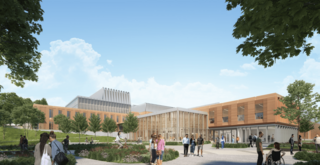Quantum science and engineering has emerged as a frontier of fundamental knowledge about how the universe works. With over 30 research groups across campus contributing to critical breakthroughs, Yale is a leader in the field.
1998
Robert Schoelkopf is appointed to the Yale faculty. Two years later, he is awarded the Packard Foundation Fellowship to develop new types of high-frequency superconducting electronics for controlling quantum circuits.
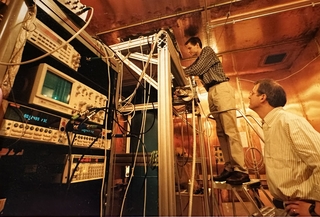
2001-2002
Distinguished faculty members Michel Devoret and Steven Girvin are recruited to Yale. They bring further expertise in the quantum behavior of electronic circuits with superconducting elements. The first long-lived superconducting quantum bits, or qubits, are demonstrated.
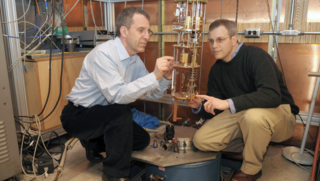
2005
Dave DeMille and his research group develop a technique to produce ultracold polar molecules and propose to use them as qubits for quantum computation.
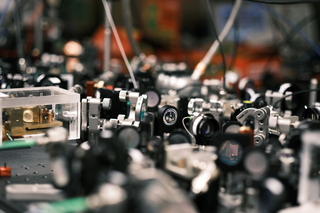
2009
The Devoret, Girvin, and Schoelkopf research groups invent a new superconducting qubit, a way to read it out efficiently, and the quantum “bus” that entangles two of them, leading to the realization of the first solid-state quantum processor running an algorithm. This achievement was commemorated in the museum exhibition “The Quantum Revolution: Handcrafted in New Haven.”
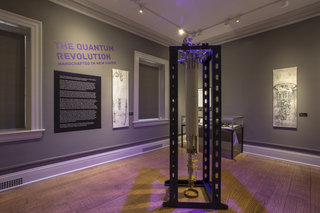
2014
Hong Tang and Liang Jiang’s research groups develop a chip-scale device that uses the wave-particle duality of single photons to sense the presence of an object without interacting with it, useful in spectroscopic studies of photosensitive materials.
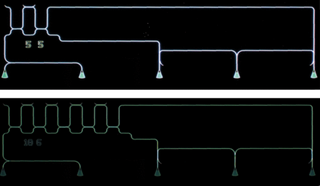
2015
Created the previous year, the Yale Quantum Institute (YQI) moves into its renovated space at 17 Hillhouse Avenue. Yale President Peter Salovey officially launches the institute. An umbrella organization spanning 5 Yale departments and 29 research groups, YQI’s purpose is to facilitate the research and teaching of quantum science on campus.
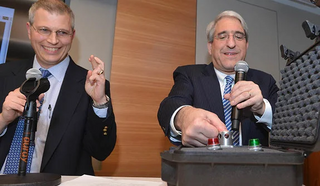
2016
YQI researchers explore a new paradigm for quantum computing based on “Schrödinger’s Cat” states of light (photons). These researchers are the first to demonstrate effective error correction with such photon qubits, a critical step toward computation with logical qubits.
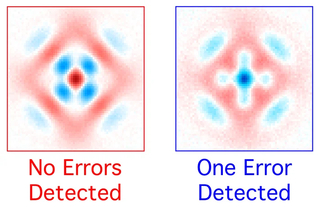
2019
YQI researchers and artist-in-residence Spencer Topel use Yale quantum computer prototypes to make music based on quantum signals. One might call this the first real application of quantum computers.
2023
Using a process known as real-time quantum error correction, Yale researchers substantially extend the lifetime of a qubit for the first time. This long-sought-after goal has been one of the trickiest challenges in quantum physics.
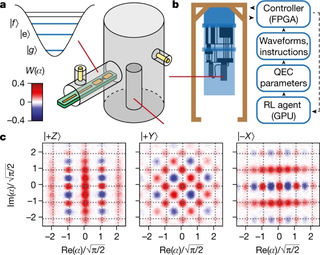
2024
A three-day conference drawing guests from around the globe commemorates the 20th anniversary of Yale scientists’ first published studies in their trailblazing approach to quantum computing: circuit quantum electrodynamics, or Circuit QED.

2025
UNESCO and the United Nations proclaim 2025 the International Year of Quantum Science and Technology (IYQ). The Yale Quantum Institute is an official participating partner.
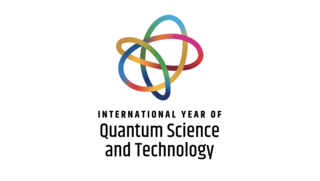
2030
Estimated completion date of the Upper Science Hill Development, one of the largest capital projects in Yale’s history, totaling more than 600,000 gross square feet. The development will include the Physical Science and Engineering Building (PSEB), a generational complex supporting initiatives in quantum science, engineering, and materials.
